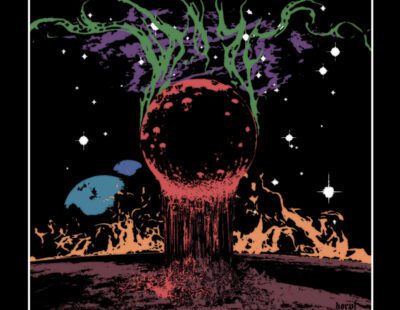
I was young. Just about tall enough to see the full screen. As my mother unloaded and folded laundry, I hung around the video juke box in the laundromat smelling like Tide as I waited for it to play the free videos. I didn’t have money, every coin in my mother’s pocket mattered. I waited. I don’t remember much about the day when Ozzy Osbourne’s “Bark at the Moon” played for the first time, but it was transformative. Half horror story and half Masterpiece Theatre, my overactive imagination was instantly captured through sound, visuals and story. Even at that age I already wrote simple horror. Still have them as well — thanks, Mom. As I continued to watch, my entire body shook with relief.
A sound to match my inner life. A new world opened to me.
For those who revel in the wilder depths and most infernal regions of dark fiction, the exploits and triumphs of V Castro over the last couple years are already the stuff of underground legend: The Mexican American ex-pat writer has sought to give voice (and, sometimes, very sharp teeth) to the marginalized other on the page — see, for example, Maria the Wanted, the tale of a “would-be immigrant turned vampire in Juarez, Mexico” who becomes a hero to the vulnerable and scourge to monsters, human and otherwise; or Hairspray and Switchblades, in which an immigrant family descended from an ancient shapeshifter bloodline square off against modern depravity and the San Antonio Stripper Ripper — and off via both her tireless championing of diversity in horror and the Fright Girl web portal designed to raise up and celebrate “those in the margins.”
As the passage above clearly demonstrates, heavy metal is a major source of inspiration and fire for Castro as well. Ask her about it, as Decibel recently did, and she’ll go some rapturous — and, as you will momentarily see, profound — places. The end of this cursed year seemed as apropos a moment for the Metalnomicon to feature Castro as any: The anthology she edited with Cynthia Pelayo, Latinx Screams, has an extremely metal cover and a spirit to match, arrived last week. And her story for the Inferno anthology, “At the Bottom of My Lake of Blood,” was explicitly inspired by Slayer’s “Seasons in the Abyss.”
“[Heavy metal] has many meanings as we all experience different realities,” Castro tells Decibel. “For me, the heavy conveys the heaviness that can accompany life. The heaviness of poverty. Of seeing a close female relative’s face bashed and bloodied from a dispute. The heaviness of uncertainty. And as a woman of color, it conveys the rage I have felt. Profound frustration. And no matter who you are or your background, we all experience a heaviness. When the words cannot be conveyed, or screamed, there is always music to express it for you. Latinx Screams was my desire to bring forth the screams from the Latinx community.
“[Metal] reminds you that no matter what is happening, you are still alive,” she continues. “I’m no musician. I write horror, but, like heavy metal, I don’t shy away from the heaviness of life. Or the sensual.
“Metal can also be unifying, like horror. My father is now an aging hippy who had every damn rock and metal album under the sun. The covers — like the videos on MTV, horror film VHS covers — were an obsession of mine as a child. I held his records before the laundromat. To this day I have only one in my possession. Funny enough it was my favorite cover, Jeff Wayne’s War of the Worlds. For some unknown reason it was the only one he had left. I believe it was to cement the forgiveness and healing between us. No matter what anyone says, I believe music, including heavy metal, is a balm. I have experienced it. I hope storytelling can be unifying and healing for us a species.”
Castro’s metal-philia firmly established, she sent along the following playlist to accompany your Inferno and Latinx Screams journey…

Metallica: “Orion”
Every time I listen to this piece of music, it evokes different emotions and images for me. It tells a thousand stories depending on the listener. The first time, I felt there was something incredibly charged within the slow build up of the guitar and drums. Expectation. Oozing hot magma. Then it comes at you all at once in an explosion of relentless beauty. This song exemplifies everything I wanted to express in the cover of Latinx Screams. Rich color and Death itself captivated by a book that tells the tales of voices often left in the deep.
Emperor: “A Fine Day to Die” by Bathory
I couldn’t think of a better song to accompany Pancho Claus Vs. Krampus in Latinx Screams. Ihsahn’s voice and guitar begin as soft as light snow falling beneath the aurora borealis on a cold winter’s night. Calm turns to terror. Krampus stomps in the snow when the music changes with his chains in hand to confront Pancho Claus. I imagined the change in vocals the hot breath expelled by the creature as it creates wispy eddies of white in the freezing wind. A fight to the death ensues. You will have to read it to find out the rest!
Alice in Chains: “Rooster” and “Man in the Box”
Latinx Screams opens with “Sangre Derramada” by Hector Acosta. It takes place in a chicken slaughterhouse. A place of low pay, reprehensible treatment of the animals and workers. The stink saturates everything. Feathers and viscera strewn across the floor that could be your own. But work is work and food is food. Rooster begins like those early hours without sleep, but knowing you have to wake up for the daily grind that can be a horror for some. The monotony of unrealized dreams. Taking what you can get when you can get it. But beneath it all there is the simmering rage. All things hidden are never left for long. “Man in the Box” conjures the effects of colonialism for me and is a resounding prayer to Santa Muerte. After the Spanish invasion, the indigenous were forced to convert, if they survived the many atrocities of that time. But faith doesn’t die easy when it is real. Many of the indigenous deities were repackaged as Catholic saints. Santa Muerte is the version of the death goddess, Mictecacíhuatl. (Next year I have a novel dropping all about this goddess, The Queen of The Cicadas.)
Slayer: “Seasons in The Abyss”
Inferno is an anthology based on the levels in Dante’s Inferno. It had been years since I read this book. I did a little brush up to figure out where my mind would settle knowing it had to be super dark. It would seem Slayer possessed the answer. The chords painted the images as I wrote. It feels downtrodden in the beginning. A desire to escape with eyes upturned. Marry this with knowing what it is like to be The Other, I had to take on the character of Satan. But not in the traditional sense. I am a Mexican woman, and this would be reflected in the story. It’s about casting off labels and expectations. A self-acceptance that has the power to break through chains straight to the world of the living. When the initial work is complete, you can leave behind the past to create a new future. Everything about this song breathes life into the story. It was love at first sight.
Twisted Sister: “We’re Not Gonna Take It”
The theme for Latinx Screams was to express your truth and experiences through horror. Writing and storytelling are acts of rebellion that have the power to create change. I gave the authors no limits because there is enough of that in life especially when you come from a marginalized community. In short, you don’t have to take shit anyone is shovelling.
Danzig: “Her Black Wings”
Although “Her Black Wings” was the image I saw for the character, all of Danzig’s music encompasses what I like to call the dark feminine. (See also Bather’s excellent cover of this song, premiered on the site in October — .ed) This captures are the things said and done behind closed doors with lights on, beneath a full moon, or by candlelight. It’s dark feminine because it challenges the shyness and shrinking women are supposed to exhibit in life to make others feel more comfortable. The lack of deep connection we deny with ourselves because “Women can’t be like that.” Danzig’s music tears theses notions down.
His vocals can be a tender kiss to the neck or the crack of a breaking headboard. A box spring mattress reduced to rubble. Seduction begins in the mind. It’s difficult to not surrender to the seduction of all your senses when listening to Danzig. Life is a sensual experience at the heart of it. It is by our senses we perceive the world. Dark feminine is also power. Not the power of controlling another, or their destruction. It is the dark power of knowing who you are and what you want without being afraid of it, including deep desire. That is a power anyone can possess. I also write erotic horror (Sed de Sangre) because life is far too short to deny feeling truly alive. Glenn, darling. If you are reading this, I have mega ideas for Verotica!
Metal is sexy, rebellious, raw and real. It can be you. It is me.







